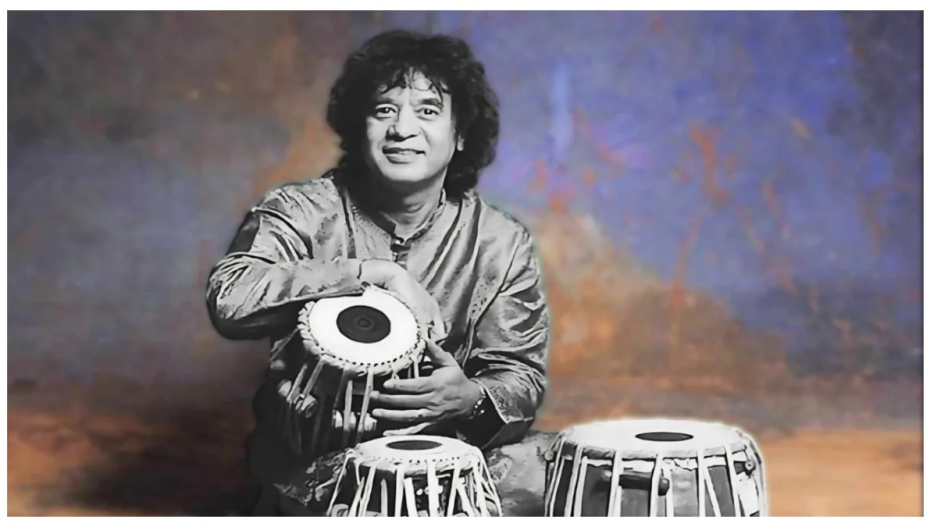Ustad Zakir Hussain, widely regarded as the greatest tabla player of his generation, passed away on Monday in a hospital in San Francisco, USA. He was 73.
According to a statement from his family, Hussain succumbed to complications arising from idiopathic pulmonary fibrosis. He had been hospitalised for two weeks and was moved to the intensive care unit (ICU) as his condition deteriorated.
His sister, Khurshid Aulia, revealed that he passed away “very peacefully” after being taken off the ventilator. “This was at 4 pm San Francisco time,” she told a section of media.
Hussain is survived by his wife, Antonia Minnecola, and their daughters, Anisa Qureshi and Isabella Qureshi.
Born on March 9 1951, Zakir Hussain was the son of the legendary tabla maestro Ustad Alla Rakha. Over a career spanning six decades, he left an indelible mark on Indian classical music and world music alike.
In a statement, his family said: “He leaves behind an extraordinary legacy cherished by countless music lovers around the globe, with an influence that will resonate for generations to come.”
Hussain’s contribution to music went beyond traditional boundaries. He worked with renowned Indian artists such as Ravi Shankar, Ali Akbar Khan and Shivkumar Sharma, while also collaborating with international musicians including Yo-Yo Ma, Charles Lloyd, Mickey Hart, Bela Fleck, Edgar Meyer and George Harrison.
His pioneering 1973 project with English guitarist John McLaughlin, violinist L. Shankar, and percussionist T.H. ‘Vikku’ Vinayakram fused Indian classical music with jazz, creating a genre-defying collaboration that remains celebrated.

Zakir Hussain’s artistry earned him four Grammy Awards, including three at the 66th Grammy Awards earlier this year. Among his numerous accolades, he was awarded the Padma Shri in 1988, the Padma Bhushan in 2002 and the Padma Vibhushan in 2023.
As news of Hussain’s demise spread, tributes flooded social media from political leaders, fellow musicians and fans worldwide.
Prime Minister Narendra Modi called him a “true genius who revolutionised the world of Indian classical music.” In his tribute on X, he added, “Through his iconic performances and soulful compositions, he seamlessly blended Indian classical traditions with global music, becoming an icon of cultural unity. My heartfelt condolences to his family, friends, and the global music community.”
Congress President Mallikarjun Kharge described Hussain as a “cultural ambassador who bridged borders and generations with his mesmerising rhythms.” He added, “The Padma Vibhushan tabla maestro gloriously took forward the legacy of his father with exceptional performances and collaborations.”
Filmmaker Hansal Mehta said, “The man who made the tabla sexy, who brought an accompanying instrument to the forefront, is gone. Deepest condolences to his family, fans and students around the globe.”
Grammy-winning musician Ricky Kej remembered Hussain for his humility and immense contributions to music. “Zakir Ji was known for being responsible for the careers of numerous musicians, who are now forces to reckon with themselves. His legacy will live on forever, and his influence will be felt for generations,” Kej wrote.
American drummer Nate Smith also expressed his gratitude, thanking Hussain for “all of the music you gave us.”
Rajya Sabha MP Priyanka Chaturvedi called him an “irreplaceable legend.” “The world of music will be lesser without tabla maestro Ustad Zakir Hussain. Heartfelt condolences to his family, friends, and his fans all around the world,” she said.
Zakir Hussain’s artistry transcended genres, effortlessly blending Indian classical music with jazz, concertos, and global styles. Reflecting on his approach to music in an interview last year, Hussain had said: “The mindset as I was growing up tuned itself to the idea that music is music, it’s not Indian music or that music, so when I actually started working with musicians who were non-Indian, it seemed like a natural handshake.”
His lifelong dedication to music, guided by his father Ustad Alla Rakha’s tutelage, created a legacy that will inspire generations to come.
Also Read: Ayodhya’s Ram Temple Project Wins UK’s ‘Sword of Honour’ for Safety Standards













